

Post-Intervention Prospects for Mali’s Tuareg. L’Occident principalement la France cherche toujours à avoir une mainmise sur les anciennes colonies africaines notamment celles riches en ressources minières telle l’Algérie qui contrairement à certains pays arabes, elle n’a pas été traversée par le blizzard printanier.
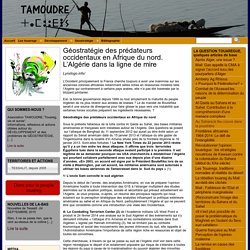
Est- la bonne gouvernance depuis 1999 ou tout simplement la maturité du peuple Algérien de ne plus revenir aux années de braises ? Le 4e mandat de Bouteflika serait-il une source de divergence pour faire glisser le pays vers une instabilité que certaines forces occultes préparent les ingrédients nécessaires. ? Géostratégie des prédateurs occidentaux en Afrique du nord Sous le prétexte fallacieux de la lutte contre Al Qaida au Sahel, des bases militaires américaines et françaises sont installées autour de l’Algérie. Expert Brief: John Campbell and J. Peter Pham on the United States' Strategic Interests in the Sahel.
Authors: John Campbell, Ralph Bunche Senior Fellow for Africa Policy Studies, and J.
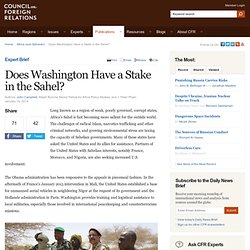
Peter Pham January 14, 2014 Long known as a region of weak, poorly governed, corrupt states, Africa's Sahel is fast becoming more salient for the outside world. The challenges of radical Islam, narcotics trafficking and other criminal networks, and growing environmental stress are taxing the capacity of Sahelian governments. Many of these states have asked the United States and its allies for assistance. Www.ieee.es/Galerias/fichero/docs_opinion/2013/DIEEEO87-2013_ConflictosMali_JuanSalom.pdf. Special Collection: "Region in Crisis: Stabilizing Mali and the Sahel" Special Collection Editor: Robert Muggah Editor: Steven Zyck Collection launched: 12 Jun 2013 This special collection puts a spotlight on the Mali and the complex regional dynamics across the Sahel.
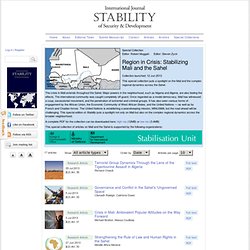
The crisis in Mali extends throughout the Sahel. A complete PDF for the collection can be downloaded here: high res (12MB) or low res (3.4MB) The Local Face of Jihadism in Northern Mali. In April 2012, the fall of northern Mali to a mixture of jihadist groups and irredentist Tuareg rebels caught the international community by surprise.[1] Two months later, the three jihadist rebel factions expelled the Tuareg separatist National Movement for the Liberation of Azawad (MNLA) from the Malian city of Gao and many of the north’s towns and villages.
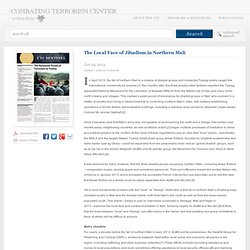
This marked a peak period of dominance for jihadist groups in Mali, who evolved in a matter of months from living in desert hideouts to controlling northern Mali’s cities, with leaders establishing operations in former Malian administrative buildings, including a mansion once owned by deposed Libyan leader Colonel Mu`ammar Qadhafi.[2] Once it became clear that Mali’s army was not capable of reconquering the north and a foreign intervention was months away, neighboring countries, as well as Malian actors,[3] began multiple processes of mediation to arrive at a political solution to the conflict.
All Politics (and Militancy?) Www.ies.be/files/2013-02_Sahel.pdf. Simmering Conflicts in the Sahara. The Sahara encompasses a vast expanse of territory fraught with weak governance, pervasive corruption, porous borders, and transnational criminal networks.

And radical groups, like al-Qaeda in the Islamic Maghreb (AQIM), are able to exploit the insecurity and pose a threat well beyond the region. In a Q&A, Frederic Wehrey and Anouar Boukhars, co-editors of the new book Perilous Desert: Insecurity in the Sahara, discuss the sources of instability and what can be done to address the simmering conflicts. Foreign assistance from the West must move beyond a narrow counterterrorism focus and governments in the region need to cooperate and demonstrate the resolve to tackle the root causes of the chaos.
What are the major security problems in the Sahara? Mali’s Regional Ramifications. Given the grim prospects for resolving the crisis in Mali, North African governments will have to look South on security matters for years to come.
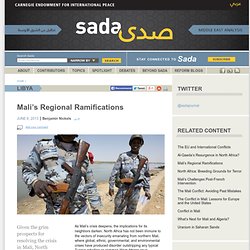
As Mali’s crisis deepens, the implications for its neighbors darken. North Africa has not been immune to the vectors of insecurity emanating from northern Mali, where global, ethnic, governmental, and environmental crises have produced disorder outstripping any typical Tuareg rebellion or common West African coup. National, regional, and international responses in Mali have staunched the chaos but have not built durable stability, and viable long-term solutions have yet to appear. The progressive entrenchment of the crisis, meanwhile, makes Mali’s security impacts in North Africa all the more significant.
The most direct and immediate costs to North Africa have been regional in nature. In Mauritania, meanwhile, the Mali Crisis touches on fundamental domestic dynamics. Benjamin P. Islam in Mali since the 2012 coup — Cultural Anthropology. Before the 2012 coup in Mali, for many observers Islam was just one taken-for-granted feature of the country’s rich cultural landscape with its spectacular mosque architecture and celebrated Arabic manuscript collections in such world heritage sites as Timbuktu.
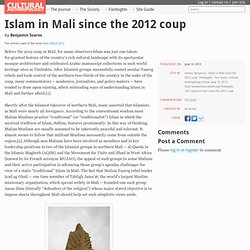
After Islamist groups successfully ousted secular Tuareg rebels and took control of the northern two-thirds of the country in the wake of the coup, many commentators – academics, journalists, and policy makers -- have tended to draw upon existing, albeit misleading ways of understanding Islam in Mali and further afield.[1] Shortly after the Islamist takeover of northern Mali, many asserted that Islamists in Mali were nearly all foreigners. According to the conventional wisdom most Malian Muslims practice “traditional” (or “traditionalist”) Islam in which the mystical tradition of Islam, Sufism, features prominently.
Understanding Currents of Islam in Mali — Cultural Anthropology. As political turmoil and violence in Mali have garnered international attention, the role of Islam in Mali has drawn considerable public notice as journalists worldwide have endeavored to characterize Mali’s vast Muslim population for their audiences.
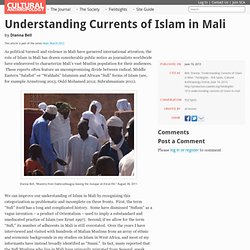
These reports often feature an uncompromising divide between radical, Middle Eastern “Salafist” or “Wahhabi” Islamism and African “Sufi” forms of Islam (see, for example Armstrong 2013; Ould Mohamed 2012; Subrahmaniam 2011). We can improve our understanding of Islam in Mali by recognizing this categorization as problematic and incomplete on three fronts. First, the term “Sufi” itself has a long and complicated history. Hot Spot: Mali — Cultural Anthropology. Folo Folo Kuma or A Prefatory Word Before the events of late March 2012, most people - even those who regularly follow global news - probably had very little awareness of Mali, its location, its history, its culture, its challenges.
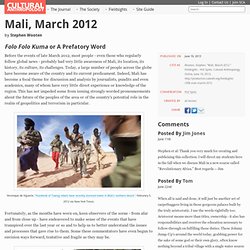
Today, a large number of people across the globe have become aware of the country and its current predicament. Indeed, Mali has become a focal theme for discussion and analysis by journalists, pundits and even academics, many of whom have very little direct experience or knowledge of the region. This has not impeded some from issuing strongly worded pronouncements about the future of the peoples of the area or of the country's potential role in the realm of geopolitics and terrorism in particular. Les Touaregs au Mali et au Niger, analyse géopolitique. Il s'agit d'une épreuve proposée à des élèves de 4e du Collège de Saussure à Genève (= terminales de Lycée) en juin 2002 suite à un travail de recherche d'analyse géopolitique.
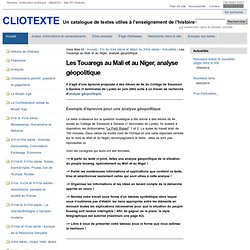
2.2. Du pouvoir ethnique Touareg à la sanctuarisation de l’AQMI et les « dires » de l’État dans l’espace saharo-sahélien au Mali. Mali’s Sleeper Cell – By Andrew Lebovich. When Agence France-Presse (AFP) reported late last month that Malian authorities had broken up an alleged cell of seven fighters from the Movement for Oneness and Jihad in West Africa (MUJAO, in French) in March in Bamako, it seemed to confirm suspicions many Malians and regional observers had held for months. After the fall of northern Mali and its progressive takeover by jihadist groups, many began to fear attacks in regional capitals. The French intervention in Mali in January, and subsequent threats by MUJAO spokesman Adnan Abu Walid Sahraoui to stage attacks in Bamako, Ouagadougou, and Niamey, compounded these concerns, as did a public warning about a bomb threat in February from the U.S.
Embassy in Dakar. Still, the arrests last month seemed to mark the first confirmation that a “sleeper cell” planning to commit attacks existed in Bamako. And the Malian security services wanted to be sure everyone knew about it. Mali: Which way forward? A chat with Bruce Hall, Baz Lecocq, Gregory Mann and Bruce Whitehouse. Domestic politics meets foreign intervention - what future for the Malian state? A little over a year ago, a few friends met to hang out online and talk about the political crisis in Mali (the text was published here and entitled ‘Mali: How Bad Can it Get?’) . We thought of this as a virtual grin , with much debate over who was the dogoni who would make the tea.
It was a blistering hot day in Bamako and the power was out in his neighborhood, so Bruce Whitehouse joined us online from a cybercafe. Northern Stalemate Opens Space for Islam in Mali's Politics. Touaregs du Mali. Des hommes bleus dans une zone grise. Avec les Grandes Découvertes de la fin du XVe siècle et la naissance du capitalisme marchand, apparut le processus historique de mondialisation. Celui-ci prit une forme industrielle et financière au XIXe siècle et connut un premier apogée avant la Grande Guerre. Les deux conflits mondiaux, la crise des années 1930 et la Guerre froide rétractèrent et/ou figèrent le processus.
La fin du communisme le relança dans les années 1990 et, depuis, il se trouve en phase d’accélération et d’amplification. La mondialisation engendre une dynamique qui, tout à la fois, intègre et fragmente ou marginalise, car elle produit de l’inégalité. Ainsi s’opposent un “centre“- polycéphale – du monde et des “périphéries“. De l’Antiquité à nos jours, la région Sahara-Sahel comprit de multiples espaces échappant à l’exercice d’une réelle autorité politique. Cela fait par conséquent planer une lourde menace sur la sécurité des États de la région, sur l’Union européenne et sur les États-Unis . Www.gatehouseadvisorypartners.com/assets/media/documents/malis_tuareg__wpr.pdf. Post-Intervention Prospects for Mali's Tuareg: Part II. Editor’s note: This is the second of a two-part series on Tuareg politics in northern Mali. Post-Intervention Prospects for Mali's Tuareg: Part I. Iyad: An Epic of Modern Mali.
“My word is pure and free from all untruth; it is the word of my father; it is the word of my father’s father’s. When a quarrel breaks out between tribes it is we who settle the difference, for we are the depositaries of oaths which the ancestors swore…by my mouth you will learn the history of Mali. By my mouth you will get to know the story of the ancestor of great Mali, the story of him who, by his exploits, surpassed even Alexander the Great; he who, from the East, shed his rays upon all the countries of the West.”
–(A griot prepares to tell the 13th century tale of Sundiata, who would return from exile to unite and rule the Malian Empire). Iyad: An Epic of Modern Mali. Part 2 Childhood and Exile: Rebel Politics and the Politics of Hunger. This post is the second in a series comparing the epic lives of Sundiata, medieval Malian ruler, and Iyad ag-Ghali, a power player and leader in Malian rebel movements for nearly forty years. You can read part 1 here. Mercadear con el Islam. The Causes of the Uprising in Northern Mali. “Long live Azawad!” “May Allah bless Mali!” Through December and early January, the tone of the exchanges on various Tuareg chat forums was expectant, frustrated, even desultory at times.
Everybody knew something big was about to happen. They had known for some time already. But when exactly? Messages of support and relief poured in from Mali, Niger, Libya, France, Saudi Arabia and the entire Tuareg diaspora. BRIEFS. The Mali conflict: avoiding past mistakes. Time to Clarify Objectives in Mali / Mediterráneo y Oriente Medio / Opinión / Publicaciones. "Time to Clarify Objectives in Mali" Francis Ghilès, Senior Research Fellow, CIDOB 1 February 2013 / Opinión CIDOB, n.º 177 / E-ISSN 2014-0843 The French satirical television show Les Guignols sums up the mood in France three weeks into this unexpected campaign: the French president François Hollande has invented “la guerre molle” (the soft war). Indeed several observers were expecting an Afghan style conflict with bloody encounters between the rebel guerrilla forces and elite French troops and coffins being flown back to Paris.
Nothing of the sort has happened. François Hollande must now explain what the objectives of France (and its allies?) Cenit: La transición de la transición. Winning the Peace in Mali: Long-term Approaches Needed. It is important that the transatlantic community shift its attention away from short-term military intervention toward achieving long-term stability. The Jihadi from the Block - By Peter Tinti. GAO, Mali — It was Saturday, Jan. 26, when the people of Gao, a trans-Saharan trading hub nestled on the banks of the Niger river, took their first act of revenge against the rebels who had terrorized them for close to a year. Spotlight on leader of Islamist group in Mali. The Man Who Brought the Black Flag to Timbuktu - By William Lloyd-George. He was once known for his drinking habits, his stylish mustache, and his serial womanizing. Mali’s Bad Trip - By Andrew Lebovich. Mali's Ethnic Tensions Fester After the Fighting.
How to tackle Mali’s crisis in the long term. Salafismo en el Sahel: lo que Europa se juega. Mali: Listening without Drones – By Gregory Mann and Bruce Whitehouse. Www.grip.org/sites/grip.org/files/RAPPORTS/2013/Rapport_2013-3.pdf. Www.grip.org/sites/grip.org/files/NOTES_ANALYSE/2013/NA_2013-03-06_FR_B.ADAM.pdf. Red Berets, Green Berets: Can Mali’s Divided Military Restore Order and Stability? Extensión del yihadismo radical en África subsahariana: Boko Haram (Nigeria), Ansar Eddine (África Occidental), IQMI (Magreb), Ansar al-Islam (África Oriental) y Al-Shabbab (Somalia)
Mali a “wake-up call” for drug trafficking, says think tank. Comment lutter contre le djihad au Mali (2/2) Au Mali, la guerre n'est pas finie (1/2) Géopolitique du Mali : un Etat failli ? Al Qaida au Sahara et au Sahel. Contribution à la compréhension (...) Mali Is Not a Stan - By Laura Seay. Post-Conflict Mali: Reprisal or Reconciliation. Mali : retour sur la menace islamiste au Sahel - Notes d'Analyse Géopolitique. La población civil, amenazada por todas las partes en el conflicto.